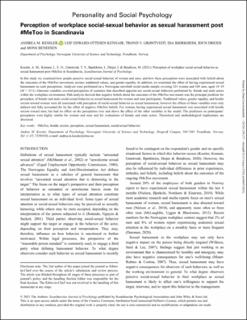| dc.contributor.author | Kessler, Andrea Melanie | |
| dc.contributor.author | Kennair, Leif Edward Ottesen | |
| dc.contributor.author | Grøntvedt, Trond Viggo | |
| dc.contributor.author | Bjørkheim, Ida | |
| dc.contributor.author | Drejer, Idun Astrid Gudbrandsdotter | |
| dc.contributor.author | Bendixen, Mons | |
| dc.date.accessioned | 2022-09-30T08:48:41Z | |
| dc.date.available | 2022-09-30T08:48:41Z | |
| dc.date.created | 2021-08-26T08:48:19Z | |
| dc.date.issued | 2021 | |
| dc.identifier.citation | Scandinavian Journal of Psychology. 2021, 62 (6), 846-857. | en_US |
| dc.identifier.issn | 0036-5564 | |
| dc.identifier.uri | https://hdl.handle.net/11250/3022772 | |
| dc.description.abstract | In this study we examined how people perceive social-sexual behavior of women and men, and how these perceptions were associated with beliefs about the outcomes of the #MeToo movement, sexism, traditional values, and gender equality. In addition, we examined the effect of having experienced sexual harassment on such perceptions. Analyses were performed on a Norwegian snowball social media sample covering 321 women and 168 men, aged 18–59 (M = 33.1). Outcome variables covered perceptions of scenarios that described opposite-sex social-sexual behaviors performed by female and male actors within the workplace environment. Path analysis showed that negative beliefs about the outcomes of the #MeToo movement was the principal predictor for perception of female and male social-sexual behavior as sexual harassment for women and men participants. Traditional values, gender equality, and hostile sexism toward women were all associated with perception of social-sexual behavior as sexual harassment, however the effects of these variables were only indirect and fully accounted for by the effect of negative #MeToo beliefs. For women, having experienced sexual harassment was associated with hostile sexism toward men, but had no effect on the perceptions over and above the effect of the other variables in the model. The predictors on participants’ perceptions were highly similar for women and men and for evaluations of female and male actors. Theoretical and methodological implications are discussed. | en_US |
| dc.language.iso | eng | en_US |
| dc.publisher | Wiley | en_US |
| dc.relation.uri | https://doi.org/10.1111/sjop.12763 | |
| dc.rights | Attribution-NonCommercial-NoDerivatives 4.0 Internasjonal | * |
| dc.rights.uri | http://creativecommons.org/licenses/by-nc-nd/4.0/deed.no | * |
| dc.title | Perception of workplace social-sexual behavior as sexual harassment post #MeToo in Scandinavia | en_US |
| dc.type | Peer reviewed | en_US |
| dc.type | Journal article | en_US |
| dc.description.version | publishedVersion | en_US |
| dc.source.pagenumber | 846-857 | en_US |
| dc.source.volume | 62 | en_US |
| dc.source.journal | Scandinavian Journal of Psychology | en_US |
| dc.source.issue | 6 | en_US |
| dc.identifier.doi | 10.1111/sjop.12763 | |
| dc.identifier.cristin | 1928835 | |
| cristin.ispublished | true | |
| cristin.fulltext | original | |
| cristin.qualitycode | 1 | |

